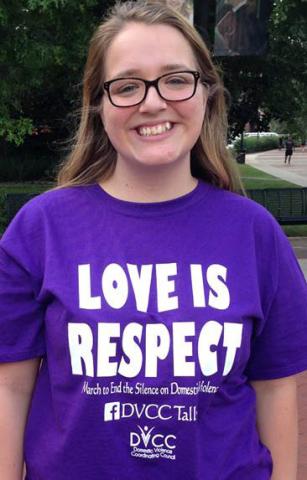March to end domestic violence

Fighting domestic violence is my passion, and as a student at Florida State University I am always looking for ways to learn more about this very important issue. The courses I have taken at the College of Social Work and my ongoing experience as a research assistant at the Institute for Family Violence Studies has provided me with a growing knowledge about domestic violence. However, as I listen to a lecture inside of a classroom and perform necessary research within an office, I always find myself wondering what the perception on domestic violence is in the greater Tallahassee community.
On Wednesday, September 23rd, the Domestic Violence Coordinating Council (DVCC) held its March to End the Silence on Domestic Violence, co-sponsored by the CSW Institute for Family Violence Studies. I was surrounded by several activists, organizations, and members of the Tallahassee community who took a stand against domestic violence that day. We were one of three groups around Tallahassee who marched to the Turnbull Florida State Conference Center to hear a survivor tell her story.
As we walked through Florida State University’s campus as a group of purple (the color for domestic violence awareness), we made sure to educate bystanders on Landis green and beyond by chanting, “No more silence; end domestic violence,” and “Love is respect.” Being a part of a group who fearlessly proclaims domestic violence as an injustice for women and men was an amazing experience. We had cars honking in support as we came closer to the Turnbull Center.
At the Turnbull Conference Center, the audience had the opportunity to hear a survivor tell her story and afterwards listen to an interdisciplinary panel of professionals discuss their work against domestic violence. The most important part of the night involved listening to the survivor tell her story. She discussed the red flags that were present in her relationship and how the abuser was physically and emotionally violent towards her. He used tactics such as stalking, harassment, and financial abuse to maintain power and control over her. She explained her reasons for staying; she felt like things would get better but they never did. She ended her story urging others who were in domestic violence situations not to stay as long as she did because no one deserves to be abused, emotionally or physically.
A unique aspect about this event is that after the survivor told her story, she opened up the floor for questions. I think she is so brave for doing that and it allowed the audience to ask her important questions. However, I was surprised to hear so many questions that had underlying tones of victim-blaming. There were questions like, “How were you comfortable with him doing these things to you,” “What made you okay with how he treated you”.
They were genuine questions that the survivor answered graciously, but you could see how it made the survivor feel like she needed to defend herself and her life choices. After the survivor came the interdisciplinary panel that helped the audience come to a better understanding of the dynamics of domestic violence. The panel highlighted their work on children’s experiences with domestic violence, LGBTQ+ specific issues related to DV, the legal aspect of DV, and the therapeutic component after DV. I think that the panel helped clarify questions and inform the audience members about domestic violence. Wednesday night provided me with a clear understanding that there is a community of support in Tallahassee that will continue to fight against domestic violence and help those who are victims.
About Morgan Lodes:
Morgan Lodes is a junior at Florida State University pursuing a Bachelor’s degree in Social Work. Currently, she works as a research assistant at the Institute for Family Violence Studies and has been a part of the Institute team since October of 2014. Part of her work at the Institute involves offering support on programs and trainings that seek to prevent all forms of family violence. As a research assistant, she is responsible for finding data and information that contributes to the dissemination of knowledge surrounding issues such as domestic violence, officer-involved domestic violence, sexual violence, supervised visitation, and child welfare.
After completing her undergraduate education, Morgan hopes to attend law school. Her special interests include civil rights law and victim services. She intends to combine the fundamental knowledge she has received from her social work education with a law degree to support and provide legal services for disadvantaged communities.
